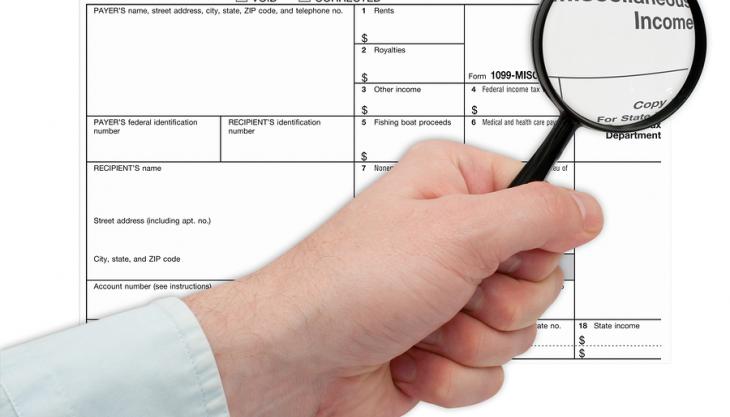Tax Consequences of Debt Relief and Bankruptcy
Submitted by Rachel R on Tue, 02/18/2014 - 6:22pm

Debt write-offs can leave you facing a large tax bill
Deciding to file personal bankruptcy is a serious step and one not to be entered into lightly. But if you have massive debts that you can no longer manage and your financial circumstances are likely to continue as-is, filing a Chapter 7 or Chapter 13 petition can be a smart move. If your debt dilemma is not so dire, you may be able to negotiate your way into a repayment plan or reduced settlements with your creditors if you have money available to make and follow through on an offer. But here's what you need to know about the tax consequences of certain debt relief options compared to bankruptcy.
Debt Settlement Firms
Some attorneys and companies offer debt negotiation services where they communicate with your creditors on your behalf to try and get you lower payoff amounts or preferable terms. Here's something you should know. You will be charged high fees for these services and they have no more tools at their command than you do. If a creditor is going to take a lesser amount, they will do it directly with you without the intervention of an intermediary.
Debt Management Plan
For those in extreme debt, another option is to sign on for a debt management plan (DMP) through a credit counseling agency. Much as with a bankruptcy trustee, you pay a monthly sum to the credit counseling service and they distribute it according to a plan they've worked out with your creditors. If your agency makes payments late, you will bear the brunt in a hit to your credit score. Some agencies offer DMPs for a low cost, while others charge big fees.
Tax Consequences of DMPs and Settlements
If either of these plans results in your paying less than your full balance owed, there will be tax consequences. For instance, if you or an agency acting on your behalf negotiate a $300 reduction in a debt, you will receive a 1099-C Cancellation of Debt form at year end. If your marginal tax rate is 20%, you'll have to pay an additional $60 on your taxes as a result. This is a negligible result but can still matter.
Tax Consequences of Allowing Debt to Go Bad
But if a larger sum is discounted or a creditor writes off a balance because they give up on pursuing the debt because they don't think it's collectible, you'll end up with a sizable tax bill. For a larger debt – say $2,000 – you'll be looking at an additional $400 in taxes. If you ignore your bills because you can't afford to pay them, the tax consequences can escalate quickly. If $10,000 is written off, you're looking at $2,000 in additional taxes. This can quickly add up to a tax nightmare.
Use Bankruptcy to Avoid Tax Consequences of Bad Debt
Debts discharged through a negotiation or a write-off will always generate a 1099-C. Why? The IRS views money you don't have to pay back as income because it effectively creates cash flow (or it would if you had any cash flowing). If you absolutely can't pay your debts and don't have the income to pursue negotiations or a DMP, filing bankruptcy is preferable to letting your debts just cave in on you.
Debts discharged in bankruptcy do not carry any tax consequences. This can be critically important if you have a car repossessed or a home foreclosed on – the difference between the loan and value of the asset recovered will be pursued by these creditors and can result in write-offs of large amounts and unthinkable tax consequences. Better to get yourself a financial clean slate if you can't afford the debts and avoid an IRS nightmare to boot.
Contact the law offices of John T Orcutt for a free consultation on your debt circumstances to see whether a Chapter 7 or Chapter 13 bankruptcy is a fit to give you a financial fresh start.
Debts Hurt! Got debt? Need help? Get started below!
Serving All of North Carolina
- Bankruptcy Attorneys Raleigh NC (North)
- Bankruptcy Attorney Fayetteville NC
- Bankruptcy Attorney Durham NC
- Bankruptcy Attorneys Wilson NC
- Bankruptcy Attorneys Greensboro NC
- Bankruptcy Attorneys Southport NC
- Bankruptcy Attorneys Wilmington NC
Bankruptcy Attorneys Raleigh NC (North)
6616 Six Forks Rd #203 Raleigh, NC 27615 North Carolina
Tel: (919) 847-9750

Bankruptcy Attorney Fayetteville NC
2711 Breezewood Ave Fayetteville, NC 28303 North Carolina
Tel: (910) 323-2972

Bankruptcy Attorney Durham NC
1738 Hillandale Rd Suite D Durham, NC 27705 North Carolina
Tel: (919) 286-1695


Bankruptcy Attorneys Greensboro NC
2100 W Cornwallis Dr. STE O Greensboro, NC 27408 North Carolina
Tel: (336) 542-5993

Bankruptcy Attorneys Southport NC
116 N Howe St. Suite A Southport, NC 28461 North Carolina
Tel: (910) 218-8682

Bankruptcy Attorneys Wilmington NC
116 N. Howe Street, Suite A Southport, NC 28461 North Carolina
Tel: (910) 447-2987
